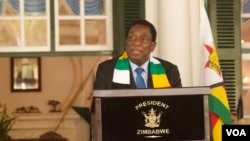The United States has sanctioned eleven Zimbabwean individuals and three entities, including President Emmerson Mnangagwa, under the Global Magnitsky sanctions program for their connection to corruption or serious human rights abuses. These designations are part of a stronger, more targeted sanctions policy towards Zimbabwe the U.S. is implementing following President Joe Biden’s approval of a new Executive Order terminating the Zimbabwe sanctions program that had been in effect since 2003.
As a result of the imposition of Global Magnitsky sanctions in Zimbabwe, all property and interests in property of the designated persons in the United States or in the possession or control of U.S. persons are blocked and must be reported to the Office of Foreign Assets Control.
Secretary of State Antony Blinken in a statement expressed continuing “concerns regarding serious cases of corruption and human rights abuse in Zimbabwe. Key individuals, including members of the government of Zimbabwe, bear responsibility for these actions, including the looting of government coffers that robs Zimbabweans of public resources. Multiple cases of abductions, physical abuse, and unlawful killing have left citizens living in fear.”
Deputy Secretary of the Treasury Wally Adeyemo stressed that these “sanctions are not intended to target the people of Zimbabwe.” They are focused on specific targets, including President Mnangagwa’s criminal network of government officials and businesspeople who are involved in corruption related to gold and diamond smuggling networks.
President Mnangagwa provides a protective shield to smugglers to operate in Zimbabwe and has directed Zimbabwean officials to facilitate the sale of gold and diamonds in illicit markets, taking bribes in exchange for his services. Mnangagwa also oversees Zimbabwe’s security services, which have violently repressed political opponents and civil society groups.
The United States, said Secretary Blinken, “is committed to ensuring its sanctions are relevant, timely, and targeted against those most closely connected to corruption and human rights abuses.” He “urge(d) the government of Zimbabwe to move toward more open and democratic governance, including addressing corruption and protecting human rights, so all Zimbabweans can prosper.”






